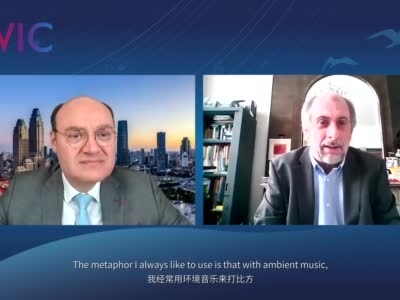
菲利普·卡尔德里斯,荷兰蒂尔堡大学提亚斯商学院战略与组织学教授。作为欧洲企业战略与变革领域的领军人物,菲利普在商业领域也拥有丰富的经验。
Filip Caeldries is a professor of strategy and organization at TIAS School for Business and Society at Tilburg University in the Netherlands。 As a leading European figure in the field of corporate strategy and change, Filip also has vast and rich experience in the business world。
高大伟:教授,你很了解中国,尤其是天津。你已经为世界智能大会做过一次贡献了。今天,我想问你两个问题,问题简短但不简单。第一个问题是,我们生活的世界里技术变革无处不在,但在你看来,什么才是真正重要的技术变革?
菲利普:确实有点难,但同时这也是一个简单的问题。我想我们都在关注同样的技术,比如人工智能、5G、物联网、增强现实,另外还有自动驾驶。我对技术本身并不感到惊讶。
我真正感兴趣的是,所有这些不同的技术是如何融合成为我们所说的“环境智能”的。我经常用环境音乐来打比方,环境音乐就是作为背景播放的音乐,它若有若无,却能营造出美好的生活氛围。同样的道理,当所有这些技术,物联网、人工智能、增强现实、5G,开始融为一体,就形成了环境智能,就像计算和智能交织在我们的日常生活中,变得与日常生活难以区分。
高大伟:非常感谢。这是一个很有趣的概念,我们必须思考——环境智能。可以肯定的是,智慧城市中有很多这样的环境智能。智慧城市是世界智能大会上的一个热门话题。作为这个领域的专家,你会如何定义智慧城市?你认为是否可以将它定义为绿色城市加上宜居城市?
菲利普:我认为这两者肯定是智慧城市的重要组成部分。但我一般这样定义智慧城市:智慧城市是一个人们使用信息和通讯技术来创造更好的生活质量的城市区域。
因此,智慧城市的核心是调动科技,包括信息通讯等技术,来创造更好的生活品质。改善生活品质的一部分确实是建设绿色城市。再次强调,有了环境智能,城市本身就会变得智能。我们会有智能垃圾桶、智能灯泡、智能建筑,你可以驾驶智能汽车出行。因此,当所有这些信息和通讯技术相互关联起来,应用在各种各样的设备上,人们的生活质量就得到了提升。我们会避免交通堵塞,而避免交通堵塞就能减少城市中的污染。所以,我认为智慧城市和绿色城市之间有非常明确的联系。
高大伟:非常感谢,教授。我们相信世界智能大会能够进一步促进环境智能的发展。我想你提到的各种技术之间的相互融合、相互联系,会给我们带来一种“涌现效应”,非常值得我们关注。再次感谢,教授。
菲利普:不客气,谢谢。
David: Professor, you know China very well and especially Tianjin。 You have contributed already to the World Intelligence Congress。 Today, I have two questions for you, short but difficult questions。 Number one, professor, we live in a world in which technological changes are everywhere, but what are, in your mind, the tech changes which really matter?
Filip: Indeed, it is a bit difficult, but also at the same time, an easy question, David。 I think we are all looking at the same technologies, Artificial Intelligence, 5G, Internet of Things, Augmented Reality。 You can add autonomous driving to that。 I don‘t think that’s in and of itself very surprising。
But what I‘m really interested in is how all these different technologies are at present merging into something that we’ve been referring to as Ambient Intelligence。 The metaphor I always like to use is that with ambient music, ambient music is music it plays in the background, you really don‘t know that it’s there, but it creates a nice living atmosphere。 Exactly the same thing when all of these technologies, IoT, Artificial Intelligence, Augmented Reality, 5G, when they all start merging into this thing, which we call Ambient Intelligence, it‘s like computing and intelligence get woven into the fabric of everyday life, and it becomes indistinguishable from everyday life。
David: Thank you very much。 This is a very interesting notion that we will have to think about – Ambient Intelligence。 Certainly, you will have a lot of this Ambient Intelligence within a smart city。 This is a topic that all the friends are going to discuss at the World Intelligence Congress。 Since you are an expert also on this issue, how would you define a smart city? Do you think it would make sense to define it as a green city plus a livable city?
Filip: I think that these are definitely two major components of it。 But the way I‘ve always defined a smart city is that a smart city is an urban area where we use information and communication technology to create a better quality of life。
So, it‘s really about mobilizing again technology, information communication technology, mobilizing technology to create a better quality of life。 Part of that better quality of life will indeed be the greening of our cities。 Again, with the presence of this Ambient Intelligence in the city, the city itself will be intelligent。 There will be intelligent garbage bins。 There will be intelligent light bulbs。 There will be intelligent buildings。 You will drive around with your intelligent car。 So again, the connectivity of all of these information and communication technologies, as they are mobilized in all of these devices, will create better quality of life。 We will avoid traffic jams。 As we avoid traffic jams, there is gonna be less pollution, less pollution in the city。 So, it’s a very easy connection I think to make between smart cities and green cities。
David: Thank you very much, professor。 Certainly, we believe that the World Intelligence Congress will contribute to the making of this Ambient Intelligence。 I think that what you have said about the merging of different technologies, the way they connect, will introduce us to phenomenon of emergence, which will be very interesting to follow。 Thank you very much, professor。
Filip: You are welcome。 Thank you。

 play
play